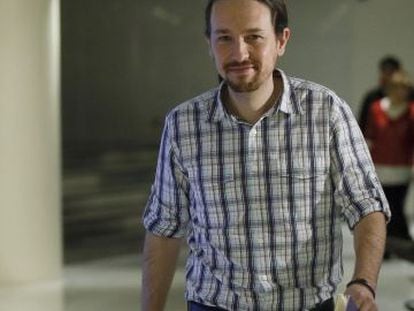Three-way meeting to break Spain’s political deadlock ends in failure
Podemos comes to negotiating table with unacceptable demands for Socialists and Ciudadanos

The first three-way meeting between the Socialist Party and the emerging Podemos and Ciudadanos was likely also their last.
Going into the meeting on Thursday, there was some hope that the parties would find common ground on which to build an alliance and break the deadlock that Spain finds itself in since the inconclusive election of December 20, which yielded a hung parliament.
But that hope was dashed early on.
“The outlook is that there will be no agreement”
Ciudadanos spokesman José Manuel Villegas
Despite their overtures of friendship, the Podemos delegation walked in with a list of demands that they knew would never be accepted by the others.
These included a significant hike in public spending and Catalonia’s right to self-rule.
Recent news that Spain missed its EU deficit target by nearly one percentage point means that the next government will likely have to make more spending cuts, not increase expenditure. Yet the Podemos team came to the table with a proposal for more than €60 billion in public outlays.
And the issue of regional self-determination is not negotiable for either Ciudadanos or the Socialists, who both favor national unity.
Sign up for our newsletter!
EL PAÍS English Edition is launching a weekly newsletter. Sign up today to receive a selection of our best stories in your inbox every Saturday morning. For full details about how to subscribe, click here.
Podemos also insisted on being part of the next Cabinet together with the Socialists and “independent consensus figures.” The anti-austerity party has repeatedly stated in the past that it will not be in the same government as Ciudadanos.
At the end of the two-and-a-half-hour meeting, Socialist spokesman Antonio Hernando said that it had basically served one purpose: to allow the 18 party representatives to tell each other to their faces what they had already been saying in the media for weeks: that their positions are simply not compatible.
Ciudadanos and the Socialists, who recently drafted a joint government program and are hoping to secure added support for it, gave statements following the get-together. Podemos instead decided to wait until Friday morning, when party leader Pablo Iglesias is scheduled to offer a press conference.
Both Hernando and Ciudadanos spokesman José Manuel Villegas conveyed the same feeling of failure after their meeting with Podemos, although the Socialist seemed hopeful that a last-minute three-way deal with the anti-austerity party is still possible. Hernando said that the Socialist Party will keep trying to bring the three together “until its last drop of sweat is dried up.”
But Villegas said that “the outlook is that there will be no agreement.”
In the meantime, the clock is ticking. If no governing alliance is formed before May 2, parliament will be dissolved and a new election called for late June. The latest surveys show that a fresh vote would mostly favor the Popular Party (PP), which already won the most seats at the December election (123) but fell short of the 176 required for an overall majority.
English version by Susana Urra.











































